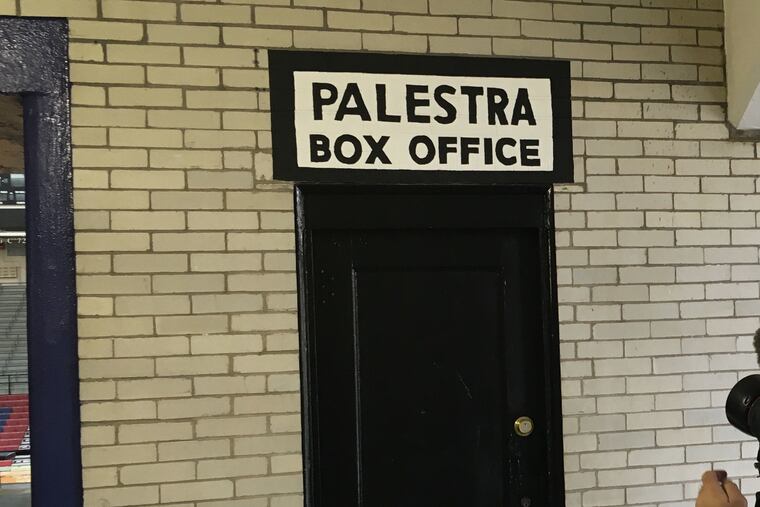When Ivy League basketball tips off is up to the virus | Mike Jensen
Penn athletic director Grace Calhoun says the league presidents will make those decisions. Expect the league’s teams to begin playing later rather than sooner, she said.

If there’s one thing we’ve all assumed, and this pandemic has confirmed, is that Ivy League presidents are not going to let any athletics tail wag their institutional dog.
While virtually every other NCAA Division I league is moving ahead (with crossed fingers) on winter sports plans, the Ivy League is taking it more slowly.
Ivy League athletic directors got together virtually last week for several days of meetings. Again, if you think Ivy League athletic directors are going to announce plans ahead of their presidents, you haven’t been paying attention.
“What we spent a lot of time talking about this week is what types of information would be helpful to the presidents as they walk up to this decision,” Penn athletic director Grace Calhoun said Friday afternoon, adding that individual campus plans for the spring semester are expected to be announced between early November and early December.
“The presidents have certainly advised that until decisions are made about who will be welcomed back to campus, you can’t really talk about athletics.”
Well, they can talk about it.
“All possible ways we could conduct a season if we are able to play,” Calhoun said of last week’s discussions.
What that means locally … It’s looking like if Penn waits until January to get on the court, the rest of the Big 5 schools already might have full schedules without the Quakers. Nobody can blame the other four. Everyone had a full slate of opponents set before COVID-19, then had to cut a few games, and also try to mostly get the nonconference games out of the way early.
There have been reports that the Ivy League could play a more limited league schedule even if some campuses don’t welcome all their students back to campus, meaning all eight schools wouldn’t have seasons.
“What I can tell you, there absolutely have not been decisions made,” Calhoun said. “Our league mindset is that, yes, we do, like to do things as a league. At the same time, as athletic directors, we’ve acknowledged that our continuation approaches have been very different. We as a league have probably been unified, with more commonality, than any other — we like when we have 8-0 votes and do things the same way …”
But, she later added …
“The theme of nimbleness and flexibility continues to be one that is shared by everyone.”
Calhoun took that thought further.
“There certainly is a train of thought that keeping the competition to just the Ivy League makes it more manageable,” Calhoun said.
She meant on dealing with COVID-19 protocols.
“Not only who is invited back to campus, but what is an acceptable group size for gatherings on campus? What are precautions for travel? Are visitors invited on to campus? We are waiting to see how those decisions get made.”
The presidents, Calhoun said, continue to say of athletics, “they are trailing decisions, not leading decisions.”
A tough thing for, say, a basketball player to hear. Calhoun gets that.
“We owe it to our student-athletes to make every attempt to give them an opportunity to compete,” Calhoun said.
Back to that nimbleness …
“This is just me talking about my own perspective — as I look at the many unknowns there are — if we started play and had an outbreak, to me the local games are really the easiest ones to [plug in],” Calhoun said.
Her point: What if two Philadelphia-area schools suddenly had an opening on their schedules in January or February due to a COVID-19 issue on their opponents' campuses … “Could you feasibly say, ‘Hey, it’s Tuesday, we have no game this weekend, you don’t either …’ Could you see some scenarios like that?”
More front and center, there have been questions about, if there is to be a Penn winter season, whether it would start after the first semester ends in December or not until January.
“It’s a presidential decision,” Calhoun said. “I would say right now we’re leaning toward later. Just out of reality. When does training start? How much training would you need?”
Also, Calhoun said, that might help get past more COVID-19 winter outbreaks. Later theoretically could be more optimal to actually get the games in.
If all this sounds like spinning wheels … yes, and no. Or no, and yes. It’s not like the Ivy League has been afraid to get out ahead of the pack. Remember the Ivy was the first Division I league to cancel its men’s and women’s postseason basketball tournaments in March.
“The longer you wait, the more data-informed your decision is,” Calhoun said of the current landscape. “But also the longer you wait, the more difficult the planning is.”
There still is an air of hopefulness that you’ll see a winter sports season for the Quakers. Nevertheless, the Ivy League’s bottom line almost writes itself.
“The presidents have advised us from the early days of the pandemic, the virus will dictate what we are able to do,” Calhoun said.